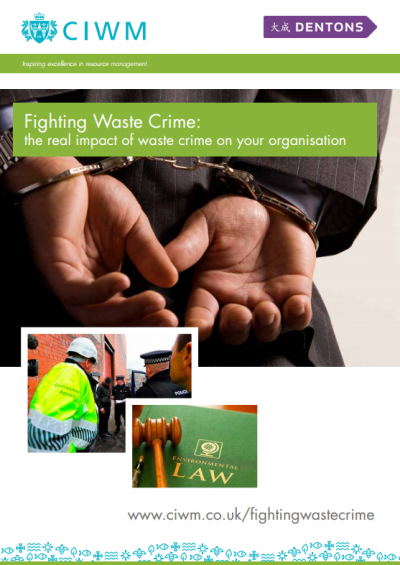CIWM launches waste crime guide
The Chartered Institution of Wastes Management (CIWM) has partnered with legal firm Dentons to launch a new guide on the impacts of illegal waste activities, as part of its year-long campaign to ‘Fight Waste Crime’.
The guide, ‘Fighting Waste Crime: The real impact of waste crime on your organisation’, aims to provide UK businesses with a better understanding of the cost and impact of waste crime, and how to ensure that they are not part of the problem.
 It draws on the expertise of senior regulators, lawyers and brand reputation experts to explain how the duty of care applies to everyone when dealing with waste, as well as other areas of regulatory compliance. It also highlights the criminal liabilities, financial penalties and reputational issues that can result from being involved in waste crime.
It draws on the expertise of senior regulators, lawyers and brand reputation experts to explain how the duty of care applies to everyone when dealing with waste, as well as other areas of regulatory compliance. It also highlights the criminal liabilities, financial penalties and reputational issues that can result from being involved in waste crime.
The guide gives a number of examples of punishments that businesses and individuals (with directors of business also liable) have been given for operating illegally. These include fines of £5,000 for a Portadown waste management company for failing to prevent another person committing waste offences by not checking that the disposal site was authorised and the 15-month imprisonment of waste operator Mark Edward Fuller for running an illegal waste site for more than a year without planning permission and an environmental permit to deposit, store, dispose and treat waste.
CIWM’s waste crime campaign will encompass a range of activities, including holding open meetings exploring topics such as fly-tipping and enforcement. The campaign also includes a renewed focus on training and qualifications, particularly in the areas of technical competence and duty of care for businesses to help them ensure they are compliant. Resources on waste crime and related issues will also be published on the CIWM website throughout the year.
The duty of care is a legal requirement established in the Environmental Protection Act 1990 for producers of commercial, industrial and household waste to ensure that it is stored, transported and disposed of without harming the environment.
Duty of care compliance has been a particular focus of CIWM’s campaign, and has seen the body contribute almost £50,000 towards the Environmental Services Association’s (ESA) own campaign ‘Right Waste, Right Place’, to inform smaller businesses about the law and their obligations.

A major issue
Launching the guide yesterday (11 May), CIWM Chief Executive Steve Lee explained: “Waste crime is now a major issue in the UK, and comes at an economic and environmental cost to UK businesses, taxpayers, and local communities.
“The substantial rewards that can be realised through illegal waste activities, coupled with challenging enforcement conditions and reduced funding for UK regulators, are factors contributing to a problem that is estimated to cost the UK around £568 million through loss of revenue for legal waste sites, landfill tax evasion, and the clean-up costs of fly-tipping.”
Writing in the guide, Dentons Partner Sam Boileau and Senior Associate Eleanor Reeves, said: “There is a perception that the overriding principle of firm but fair regulation that underpins the Environment Agency’s enforcement approach is not consistently applied. Waste operators can experience an inconsistent approach by regulators when comparing their own facilities, or the site next door with a dreadful compliance record but where little or no enforcement action is taken.
“To be effective, regulators should adopt an approach to enforcement that is consistent, firm and fair. In practice, this means adhering more closely to the Environment Agency’s regulation and enforcement principles and having the right [key performance indicators] in place to ensure a consistent application of these principles.”
The CIWM and Dentons ‘Fighting Waste Crime Guide’ can be downloaded from the CIWM website.






